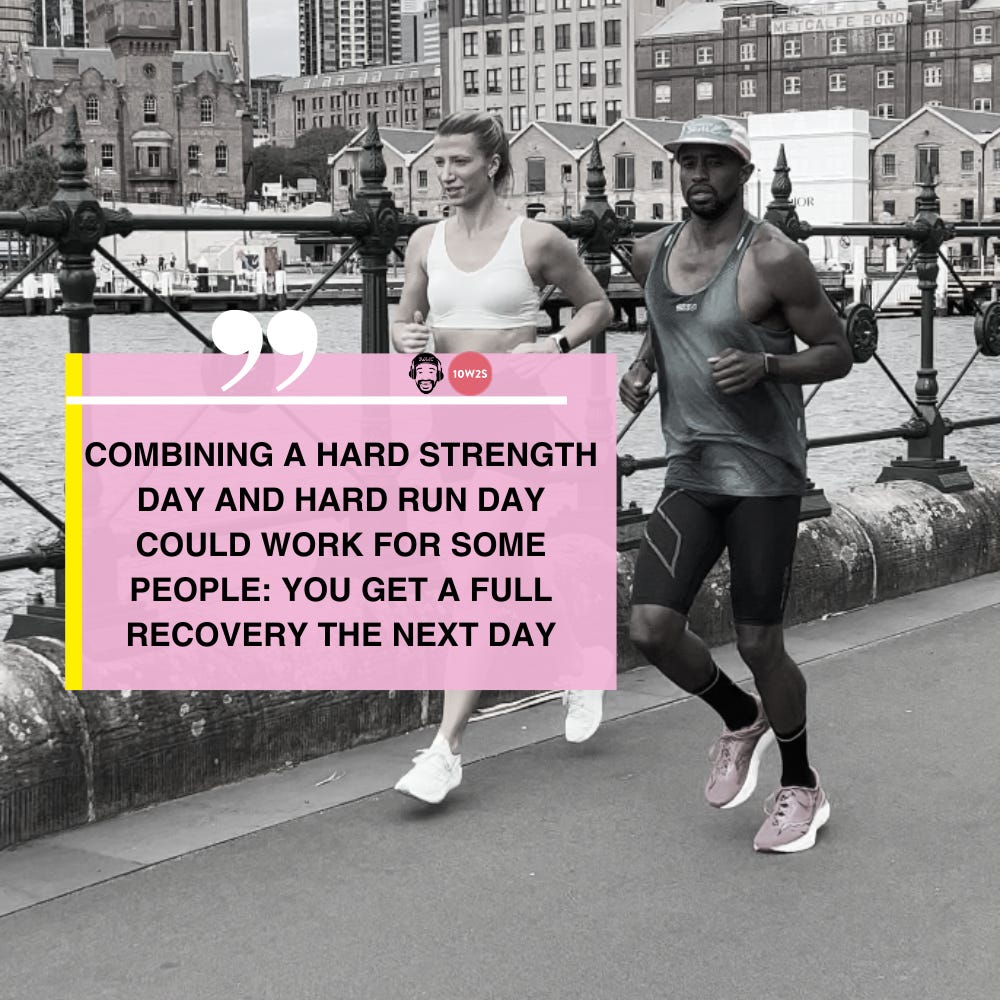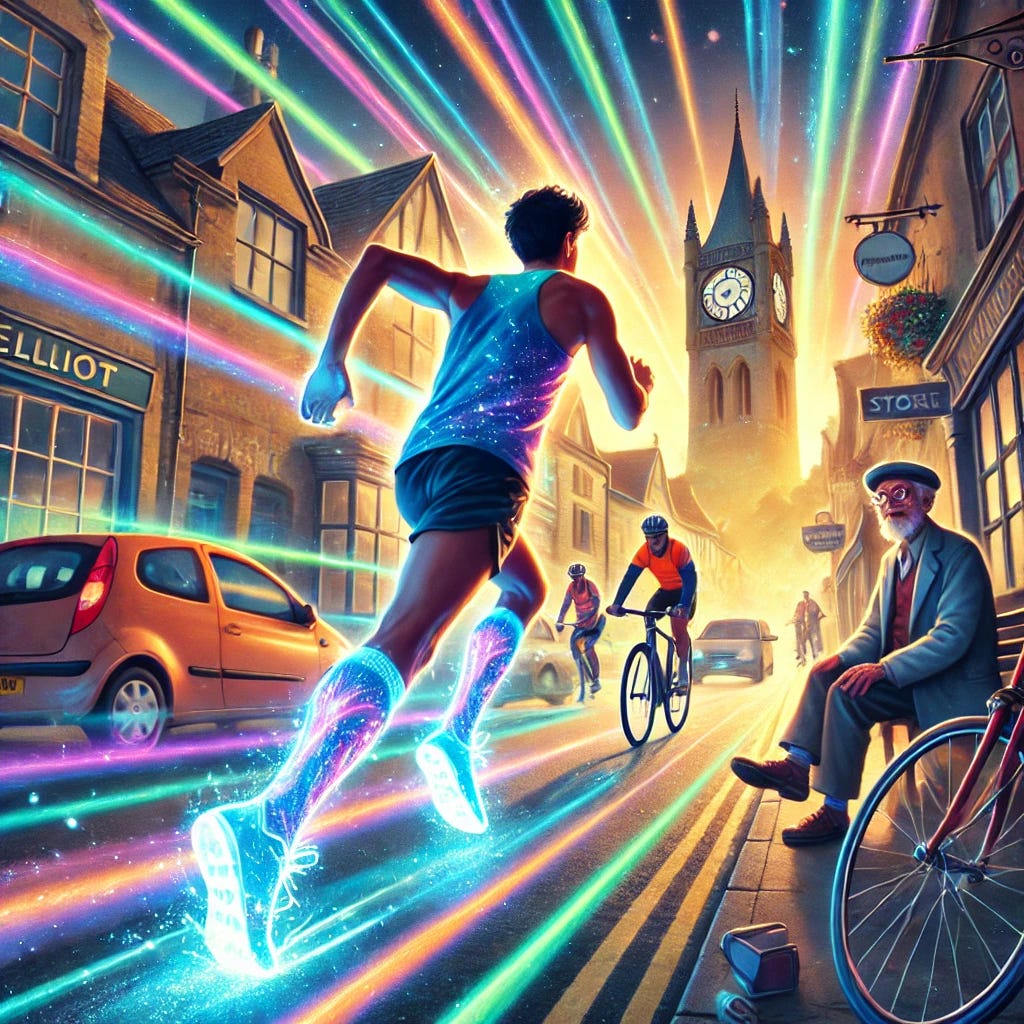The Ultimate Strength Training Toolkit For Runners
Everything you need to run for the rest of your life
TLDR because... you're probably multitasking right now and I’ve got seven more seconds of your time;
🏗️ Skyscrapers and strength training
💪 What happens to runners when they strength train for life?
🏃🏽♂️The 2024 Paris Olympic Marathon is open for all
🏋🏽♀️ Should you lift heavy or light?
🤡 Bad Dad Run Joke #2
Cool—we got through that. If you have another 5.7 minutes, please read on to become a smarter self-coached runner.
🏗️ Strength Training: Anchor Your Running Like a Skyscraper
Imagine a skyscraper. Its beams go miles into the ground, anchoring it firmly. Without this deep foundation, it would collapse.
Strength training isn’t just about making you stronger at running. It allows you to have a higher run training load (volume/distance + intensity), so you get faster in your races.
I used to think I would feel “stronger” at the end of races and that’s all strength training did. Years of research and doing resistance training taught me that strength training isn't just a nice-to-have; it's the foundation of your running performance.
You could slowly ramp up your training load, but without strength training, it takes longer and risks injury. Just because that one random 100 miles/km per week person on Strava can do it without resistance training doesn’t mean you can or that you should.
Strength training can be a turbo boost, but it's not a quick hack. It’s essential, not easy, and sometimes boring.
Build your foundation. Strengthen your muscles, tendons, ligaments, connective tissues, and bones. Your future running and life self will thank you.
Bonus for Your Future Self — If you can build and maintain muscle mass while you’re young, it’s easier to maintain and not lose it as you get older. But you have to start now. While running can help you lose fat (sometimes), it doesn't really build muscle for most people.
💪 The Ultimate Strength Training Toolkit For Runners
Strength training, like most things in life, is super confusing and nuanced. Information is everywhere, and with so many options and variations depending on each person, it’s no wonder why we runners tend to get overwhelmed.
In this article, we (me and a medical sports professional named Sam Shearman, who is also the founder of the run strength app 10W2S) will create the ultimate toolkit so that you can learn “almost” everything about strength training specifically for runners. This will help you feel more empowered to make better decisions about your training habits so you can - insert the thing you want to get from running.
We touch on;
Defining strength training terms that might be confusing
Tendinopathy vs tendinitis
Eccentrics vs isometrics vs concentric and when to do them
Why is strength training now the new bee’s knees when 50 years ago, not too many runners were doing this
Why runners tend to avoid strength training
Delayed onset muscle soreness (DOMS) and how much pain during and after workouts workouts is okay
And a bunch more!
Watch, listen and read about the ultimate strength training toolkit for runners.
🏃🏽♂️ 2024 Paris Marathon is Open To Everyone
This is awesome! I’m sure some of you already know this. Yes, I don’t follow too much news, but I’m trying to keep on top of things. If you don’t know, here is the breakdown.
What is it?
Marathon Pour Tous: An open marathon for amateurs to run the same course as the Olympic elites!
Event Name: Marathon Pour Tous
Date: August 10, 2024
Courses: Full marathon (42.195 km) and a 10 km race
Participants: 20,024 runners for each race
Route: Starts at the Hôtel de Ville, ends at Les Invalides (so scenic!)
Time: Marathon kicks off at 9 pm, 10 km at 11:30 pm (Psychopaths got people running well past midnight… crazy!)
Inclusivity: Everyone’s welcome (with a limit of 20k people), including people with disabilities, and they’re making sure it’s gender-balanced.
Why it’s dope for runners?
Epic Experience: Run the same course as the Olympic athletes—how good?!
Boost of Motivation: Running in such a high-profile event is inspiring.
Inclusive Vibes: It’s all about community—runners of all levels and backgrounds coming together. Run clubs rejoice.
Future Predictions:
More Runners: Events like this will probably get more people into running—who wouldn’t want to run an Olympic course?
Stronger Community: The inclusive nature will bring runners together, making the sport even more popular.
Better Health: Regular participation in these events is great for physical and mental health.
Innovative Events: Success here could lead to more accessible and engaging marathons in the future.
🏋🏽♀️ Should you lift heavy or light?
While I touched on this in our latest episode with a running physical therapist, this is a more in-depth breakdown of an age-old debate among bro lifters and runners but with science to back things up.
What is it?
Training Intensity: How heavy your weights are compared to your max effort, and how it affects how many reps you can do.
High Reps vs. Low Reps: More reps w/ lighter weights vs. fewer reps w/ heavier weights.
Metabolic Stress vs. Mechanical Tension: High reps = metabolic stress (burn baby burn), low reps = mechanical tension (hello strength).
Why it's important
Custom Workouts: Helps you make workouts fit your goals – gain muscle, get strong, avoid injuries.
Balanced Gains: Mixing reps hits different muscle fibers, so you get well-rounded gains.
Injury Prevention: Knowing how reps affect joints can help you train safer, esp if your prone to injuries.
How distance runners can use this info moving forward
Mix it Up: Use a combo of high, moderate, and low reps in your strength training to boost both endurance and strength.
Protect those Joints: Focus on moderate and high reps to keep your joints happy, super important for high-mileage runners.
Cycle Your Training: Plan out cycles that vary reps to keep making progress and avoid hitting a plateau.
Watch and learn if you should lift light or heavy
Bad Dad Run Joke #2
Elliot, a big-time local sub-elite runner, was kinda famous in his small town for his weird obsession with collecting socks. He thought each pair gave him a unique superpower, but he kept that to himself to avoid sounding cray cray.
One evening, getting ready for his run, he found a pair of socks in his drawer that he’d never seen before. They glowed like they had magical powers, promising insane speed.
Curious, he put them on and felt a burst of energy. As he started running, he felt super light, super fast, almost invincible. Everything around him blurred into a crazy mix of colors as he sped through the streets, passing cyclists, cars, and even a train. He felt unstoppable!
Then, a wild thought hit him: What if these socks really did have magical powers? Maybe he could outrun time and finally figure out this whole time travel/multiverse thing! Laughing at himself, he decided to test it. He took a sharp turn and sprinted toward the town’s old clock tower.
Just as he was about to break the sound barrier, there was a loud rip. Elliot tripped and fell, landing in a chaotic mess. Looking down, he saw his magical socks torn to shreds.
As he got up, an old man on a nearby bench chuckled, "Guess you found out the hard way, young man. Those socks were just too 'fast-ionable' for their own good!"








